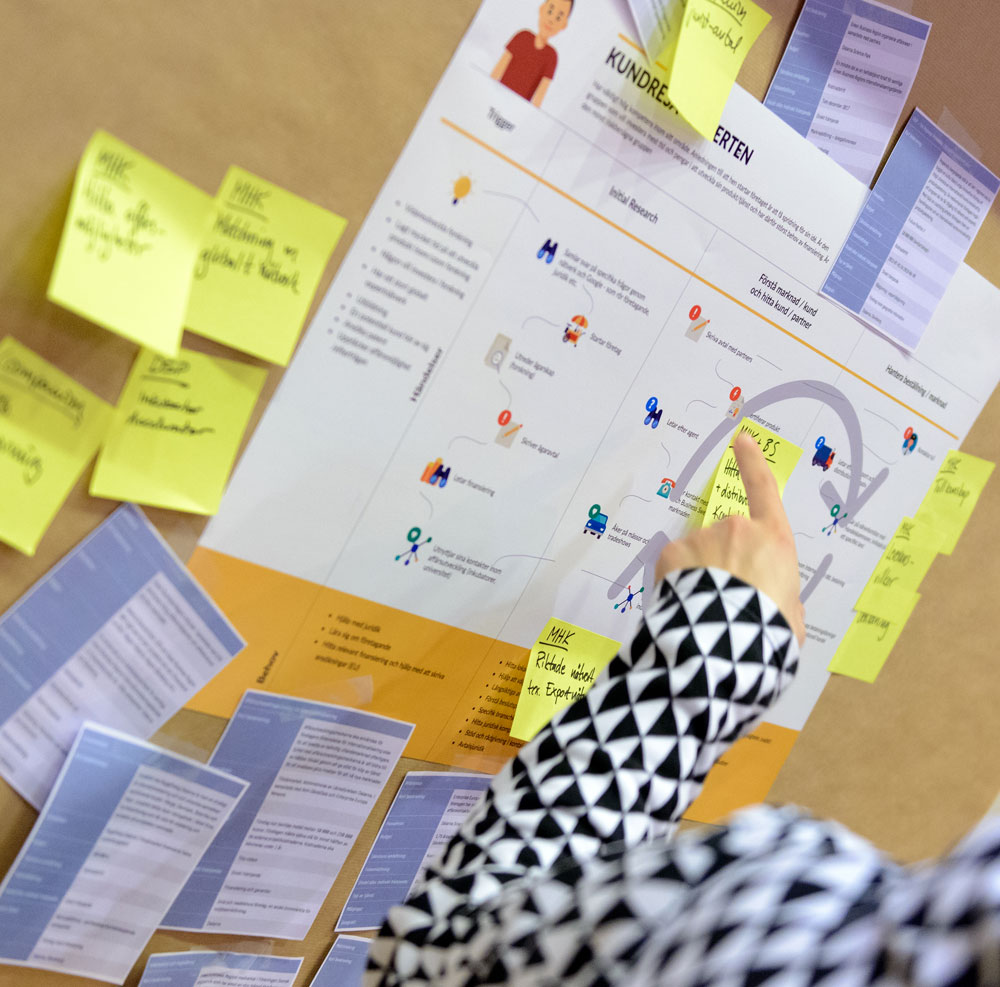Creating quality in the meeting
This article is written from a Swedish perspective. Hopefully, it can be beneficial for those interested from other countries.
Communication with our elderly poses unique challenges for us who work in healthcare. Hearing impairments, dementia, aphasia, language difficulties and more can further complicate matters. It's crucial to be aware of non-verbal communication. Those who don't understand what is being said, notice body language, gestures, facial expressions, and tone of voice. Treatment and communication go hand in hand. By trying to understand non-verbal communication as well, we can alleviate pain and anxiety. It's important that the staff is available and takes the time to listen in order to understand the resident's needs.
 Foto: Mostphotos
Foto: MostphotosHearing impairments, dementia, aphasia, language difficulties and other factors can further complicate matters. It is important to be aware of non-verbal communication. Those who do not understand what is being said will notice body language, gestures, facial expressions, and tone of voice. Treatment and communication go hand in hand.
Body Language
Sometimes employees can show through their body language that they are not comfortable with their tasks. Some may also focus more on talking to colleagues than on establishing contact with the care recipient.
Staff who have been trained in how body language, tone of voice and the way we say things affect the elderly are better equipped to do a good job. Research has shown that we have mirror neurons in the brain that allow us to quickly read emotions in others when we communicate with each other. This means that people with dementia are highly influenced by the staff's approach.
They may not always perceive and understand what is being said, especially not when several people are talking at the same time. However, they do perceive and read emotions and body language. This can lead to anxiety and aggression, which are then unnecessarily treated with medication.
Therefore, how communication occurs in all situations is very important. The caregiver should be clear, make eye contact, explain what is to be done and ensure that the person receiving care is aware of what is to happen.
Information should always be given continuously. You cannot rush. It takes longer. It is always equally important to inform the resident about what is going to happen, but even more important if the person in need of help cannot communicate verbally. Listen to understand, then real communication occurs. Try to understand the individual's needs and not just listen to give an answer.
View of Humanity
In diakonia, which has a church affiliation, there is a concept "See the person". It is about creating a culture as part of the value base. If you consider it important for employees to take the time to listen and understand the individual, you as fellow human beings and leaders must also lead by good example. This means always greeting, addressing the employee or the resident by name and taking the time to listen. You show that you are listening by being present in the conversation, regularly making eye contact and with words or in other ways confirming that you are listening. You use your "non-verbal" communication to convey your values.
If you don't have time right now, ask to return later, make sure you have time then. Put conversations about communication on the agenda, for example at APT. By taking the time to listen, you will get much more done.
There is never an excuse for poor treatment. We all have a shared responsibility to stop any negative trend. Together, we need to develop a professional approach. Supervision, discussions about values and treatment, knowledge about lex Sarah, reflection on events and checks within the staff group are some ways to prevent.
On a few occasions in my professional life, I have encountered employees who have lost their spirits and no longer have the ability to see the person or empathize with the resident's situation. In some cases, these are employees who
have had to change employers several times due to procurement and have not received either encouragement or further training for several years.
You have probably read about Lex Sarah cases where employees in care have failed in their treatment of residents. It is extremely rare for healthcare workers to be genuinely bad. Often, mistakes are due to frustration rooted in a lack of knowledge.
People who work in caring professions need recurring supervision and further education to cope with different situations that arise. Supervision is a necessity, especially in situations where staff are emotionally affected. It can then be difficult not to act based on one's own feelings. In order to be able to benefit from supervision, it needs to be regularly recurring.
The supervision may need to include many different perspectives. First, it is about meeting people with dignity even if you yourself do not receive respect. People with dementia can behave irrationally and sometimes even aggressively.
Healthcare workers must use themselves as tools to reach out. Learning from colleagues and better understanding the individual provides tools in the encounter. Supervision also includes further education when it comes to new and changing tasks. Interaction between colleagues in a team that works closely together and is dependent on each other to be able to do their job is not always easy. Cultural issues, non-verbal communication and values are other issues that may need to be discussed.
Ethics involve reflecting on moral issues. What is right and wrong, good or bad. It is about suffering, respect for self-determination and integrity. Reflection is a good method that leads to reduced stress and helps staff to come up with good solutions and positions in ethical dilemmas. In order to remain good at helping others, we need help handling the feelings that tough encounters awaken within us. Therefore, the opportunity for supervision and reflection is so important. Sometimes I can feel that we care more about the organization's cars than the employees.
It can be difficult to get recurring supervision in nursing homes where everyone works on a schedule and many work part-time. Having short feedback sessions every day where the manager regularly stops by and takes part in what is happening can be a start. Set aside time for reflection every week. Plan regular meetings where the contact person can follow up on the care efforts for their residents together with a nurse, occupational therapist and physiotherapist.
In these meetings, discussions can be held on how employees in the operation can best support the resident and their relatives. My experience is that it is important to have a clear structure so that everyone knows when and under what forms meetings take place. A work team is no stronger than its weakest link. If a colleague falters in their approach, it creates an insecure situation for the residents.
Accessible Employees
Those who live in an elderly care home are dependent on the alarms working. It could be about getting help going to the toilet or needing pain relief. By reviewing how the alarms are used and work, one can learn a lot about how the operation works. Thereby, it is possible to change routines, care plans and scheduling so that they better meet the residents' needs.
Many units have alarms for the resident to contact the staff. The response time to alarms is important for the individual's sense of security. At the same time, an alarm that constantly sounds can create stress, for both residents and staff, on the unit.
Different alarms have different purposes. There are alarms where the resident themselves alarms if they want help and alarms that go off at certain events, for example, motion alarms that go off if the resident puts their feet on the floor.
In a lex Sarah report, it emerged that staff at a residence had not responded to an alarm. This was a sheltered housing with an external patrol that should have come, but it does not change what can happen. The staff knew that the resident also had a motion alarm. When the motion alarm did not go off, the staff assumed that the resident had accidentally alarmed in their sleep.
In the morning, a supervision was done and the resident was then found dead on the floor. Someone had failed to activate the motion alarm. In addition to falls, there are other situations where a long waiting time can be difficult for the resident. Pain or the need to go to the toilet are examples of such situations.
In other units, employees have disconnected alarms from a resident who "rings too much" or because work with residents means that they cannot run on alarms. When it comes to movement alarms, sometimes the battery is dead or it has not worked for other reasons, which makes it important to have routines to check that these alarms work
It is often possible to review alarm times and other events in the alarm system. Then you can see if there are unreasonable waiting times at certain times of the day. It can be a good way to see if the scheduling is right and if routines need to be changed. Likewise patterns in the residents. Maybe someone always needs to go to the bathroom at five in the morning or has pain in the middle of the night. Then the operation can work more proactively.
Reflection questions around quality assuring treatment
Care worker:
• What do you do to create a good conversation climate?
• Are you and your colleagues good at communicating with the residents and with each other?
• Do you make sure to make eye contact with residents and visitors?
• Do you take the time to sit down and talk and listen to each other and the residents?
• How do you in the work team take care of each other when tough things happen?
• How do you notice when a colleague is run down or has trouble finding a good approach to one of the residents?
• How do you prioritize between alarms in the unit? Does anyone ever ignore an alarm?
• Can you repair or replace alarms that are broken on weekends, evenings and nights?
Manager, Nurse, Occupational Therapist and Physiotherapist:
• What do you as a leader do to create a good culture in communication?
• Do you use your body language and non-verbal communication consciously to create good communication in the workplace?
• What do you do to create a learning organization?
• How do you create a structure where there is time for reflection and knowledge exchange about the residents so that the team together can offer the best possible care?
• How long is it reasonable for a resident to wait when they alarm and is it followed up?
Residents and Relatives:
• Do you feel that communication with staff at the residence works well?
• Do you get good information from the residence?
• Are you invited to contribute with knowledge when it comes to caring for your loved one?
• Do you feel that the staff are available to the residents?
Erland Olsson
Specialist nurse
Sofrosyne - Better care every day

Aktuellt i media
- 2026-02-26 04:00 11 MTP
- 2026-02-23 04:00 01 Kvalitet
- 2026-02-19 04:00 19 Samhället utanför
-
2026-02-16 04:00
04 Bemötande
Was können Sie tun, damit Ihre Unterkunft attraktiv für denjenigen ist, der einziehen soll?
info Foto: Mostphotos
Foto: Mostphotos - 2026-02-09 04:00 14 Läkemedelshantering
-
2026-02-05 04:00
12 Personlig omvårdnad
"Fußpflege in der Altenpflege - so beugst du Problemen vor und förderst Gesundheit" Gute Fußpflege ist grundlegend, um die Gehfähigkeit zu erhalten und Wunden zu vermeiden.
info





